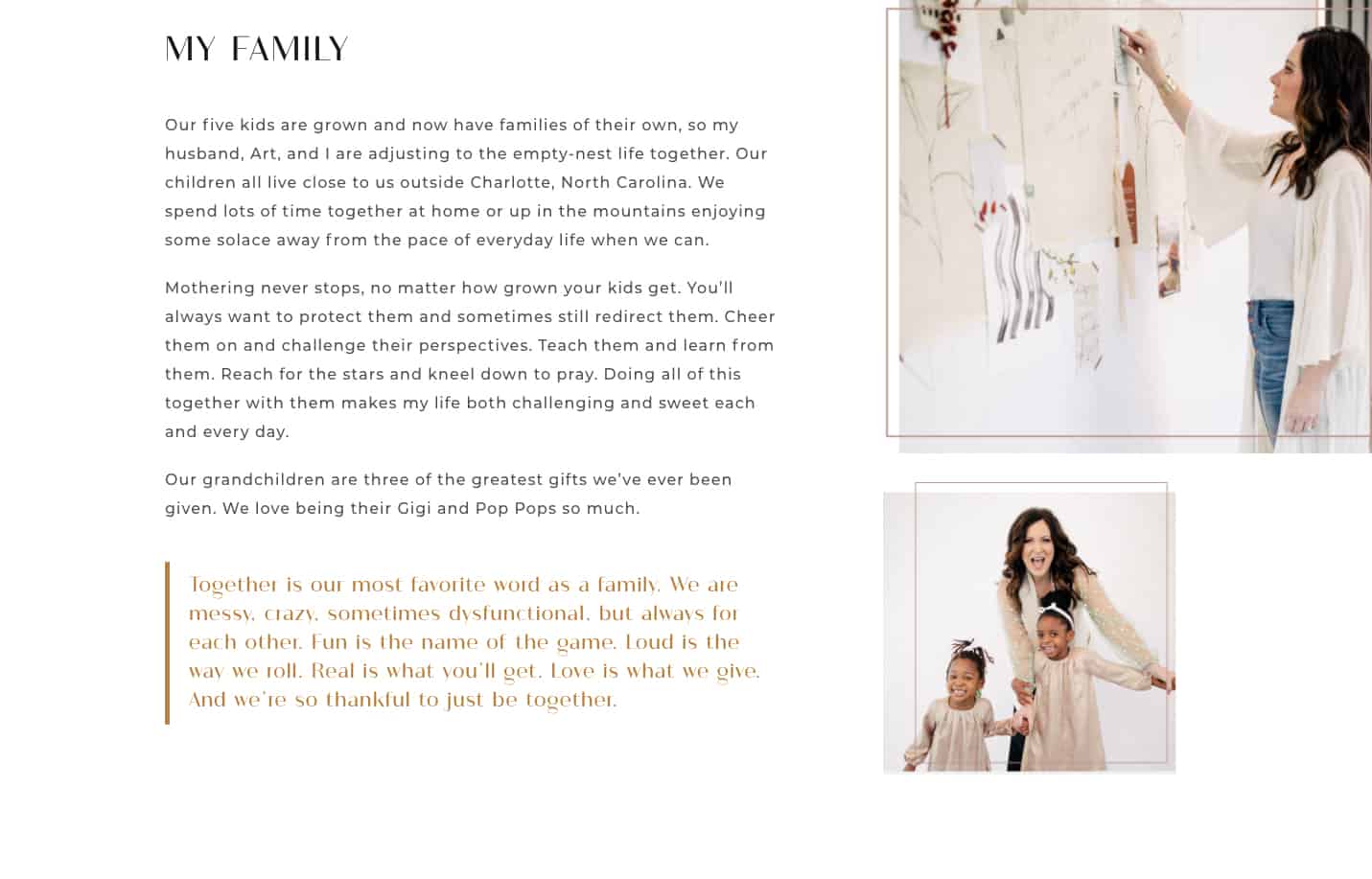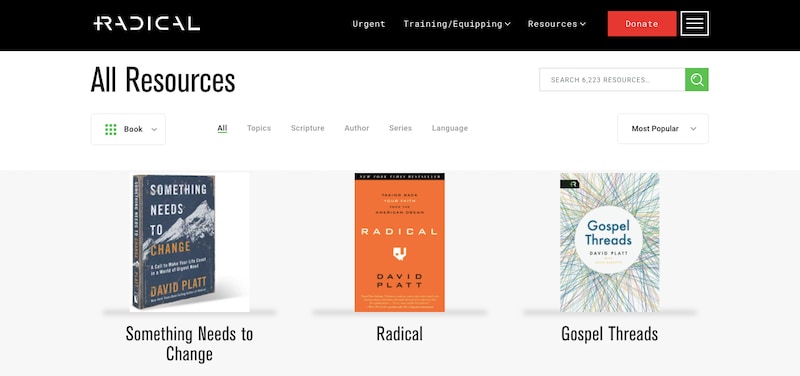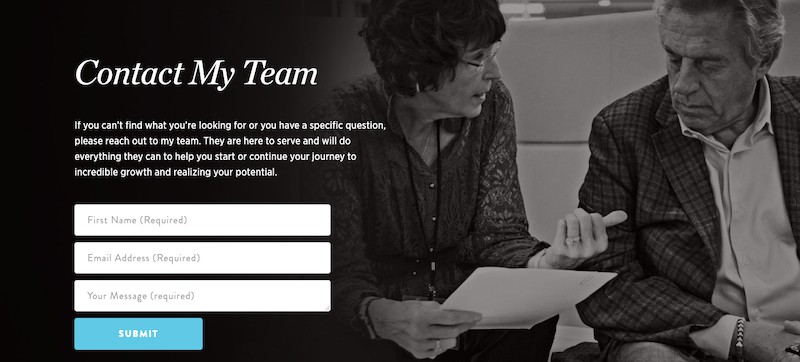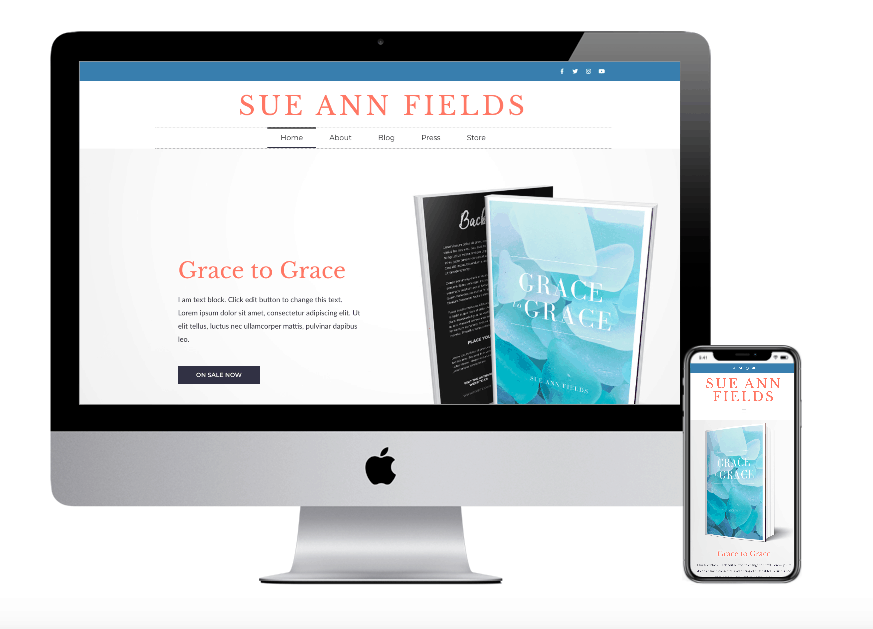Creating a great author’s website is at the top of your to-do list, but what are the top things you as an author need to include? You’ve spent time writing your book and growing your audience. Now it’s time to showcase that book with a new website. This article walks you through the best things you need for your web design for authors.
As a web designer I’ve seen what hinders author’s from selling more books and getting more author’s speaking gigs. So often they don’t know how to really utilize their online platforms to make genuine connections with their audience in order to grow their readership.
The goal of this article is to let you, the author, know the main touch points your website needs. Building a new website for your book includes more than just buying a domain name, deciding on the web hosting, and putting up a photo of your book. With that being said, it also includes more than the words on the page of your new website.
A well done web design for authors includes a laid out design and connection points for your readers. Follow along below to see my top seven things your author’s website needs to maximize your profits.
Branding and Images for Great Author’s Websites

“Don’t judge a book by its website.”
Even with this old saying in place, it still happens. When people land on your author’s website they immediately decide if it is something they want to read, inquire more about, or connect with you further.
Using images, fonts and colors that showcase the overall feel of your book is vital to helping the pre-reader understand what they’re about to read. If you write educational books, think about classic education colors and fonts. If you write playful books, include the images and colors to match.
You wrote your book to connect with readers, and images and branding can do that before they ever open your book.
As well as an overall design, your new website should also look and feel cohesive to visitors as they scroll through the elements. Using extra words and design elements for your new website aren’t needed to portray the value of your book. Simplifying the steps visitors take can help them go from finding you to buying from you or working with you faster. It all begins with your branding.
Email List Building to Build Readership

The most effective way to connect with loyal readers and build long term relationships is by growing your own email list. And the best way for an author to grow their email list is by making an easy way for visitors to sign up when they land on that website.
Email marketing is the most effective way to grow online businesses, and yours is no different.
You want to grow your email list, but a button that says, “Sign Up For My Newsletter” is not going to have the readers begging to read more.
A better way is to give away something your reader is interested in. The first chapter of your book, or even an outline of your book, is a perfect option to have readers interested and ready to buy. Growing an email list for author’s is most effective when you make the sign up button easy to see as well. Don’t hide the option to collect email addresses.
Give your readers every opportunity to join you in your writing journey. Allow them a place where they can get updates straight from your computer to their inbox. They won’t be continually coming to your website to look for updates. So, give them a reason to visit by using email marketing and growing your mailing list using your website.
A Clear Author’s Bio to Connect

As a web designer for authors, I find one of the top things you need to connect with your potential readers is found in your bio. So what does a great author’s bio include? I’m glad you asked.
A professional headshot with a short bio about your book and yourself. Your bio section of your author’s website becomes a place for visitors to see your face. This also can be an updated piece of your website that allows you to start the conversation for speaking opportunities. Use a high resolution photo here that can be repurposed for media and interviews.
Your bio needs to be clear about your background as it relates to your book. Another option in your bio section would be to connect to your Contact Me page which I discuss further down in this article.
This section is not an opportunity to write your own autobiography. To try your hand at writing your own bio, take a look at other author’s bios and emulate your favorites. Take out the parts that don’t connect with you. What do you most want your readers to know about you and your vision for the book you’ve written.
Press and Media Kits for Your Author’s Website
A press or media kit can be invaluable to a great author’s website. It can save you time and mental energy by placing these on your website. Whether you are a self published author, a traditionally published author or something in between, a press or media kit can benefit your growth.
A press kit is designed to give the media an idea of who you are and what your upcoming releases include.
A press kit is designed to give the media an idea of who you are and what your upcoming releases include. Do you have a book signing happening at a local bookstore? Include this in a press kit. This also can be a part of your social media portion of your website. If you do a press release on your social media or email then having those buttons available on your website can lead people directly to what you have coming next.
A media kit for authors is more about who you are and what you have accomplished. It is the resume for authors. Included in your media kit should be why you’re the expert in your field and how people can reach you if they want to quote or interview you. The media kit could be a tab at the top of your website for influencers and more to access that information quickly.
Your media kit also needs to be more about helping the media access your book than it should be about you. If you need tips about how to create your own media kit then peruse other author’s media kits. Reach out to publications and see their qualifications for authors. Connecting with those in your network to see what people are actively searching is beneficial to your media kit working for you.
Social Media Links to Connect with Your Audience

More and more authors these days are taking a more self published route, but even if you’ve been published traditionally then you understand the value of a growing and active social media platform. Your author’s website should include places where your readers and potential readers can find you and connect with you on social media. Have a consistent plan for pointing people from your website to your social media platform of choice.
Some of the best places to put social media icons on your website are in the header and footer. Readers know they can find these links in these places. Make it easy for them to click a button to follow you socially.
Once your website readers click the social media icons on your website, they should find a community you’re actively growing. Using your author’s website in tandem with social media is a surefire way to sell more books while also building the know, like and trust in your audience.
Bookstore Page to Sell Your Books

A website isn’t much help to an author and their book if you don’t have a way for people to actually purchase your book. An author’s website needs to include a way for people to see the book, and then buy from you.
Maybe the potential readers are coming from your social media account and they need a way to buy the book. A dedicated page to your online book store will be helpful to your visitors. A header menu section at the top of your page labeled “Store” will guide your visitors to the right place. This allows them to save time spent trying to hunt down the BUY NOW button.
Don’t want to have to stock and ship books? Or are you focused on selling ebooks online? No problem! Having a bookstore page on your site will allow you to easily redirect visitors to your Amazon book listings
Contact Me Page

You’ve got yourself a website that connects on social media, collects email sign ups and so much more. What about a Contact Me page? A contact page allows the media, bloggers, social media influencers, and other authors to email you directly.
A contact page for authors is also helpful if you want people to set up a call with you to discuss details of a speaking engagement or other opportunity. These types of pages can be connected with free schedulers to input directly into your calendar. It’ll allow you to book speaking gigs and more directly from your website.
Ready for Your Own Website?
Your website is prime real estate for your book. It houses not only the book’s information, but also yours, as the author. Having these things in place for your website is going to make it clear immediately who you are and what your book is all about.
Along with making sure your branding and images connect with your readers, you need to have many touch points along the way as people scroll through your site. Give them places to join your email list, find your press and media kits, click over to your social media and contact you for more information.
You have spent time and energy pouring your knowledge and love into this book. Maybe you’re ready for someone else to put the work into building a home your book deserves.
If building a website for authors is what you’ve been searching for, then my Quick & Easy Web Design for Author option is the best and fastest way to create a home for your book.

Marketing your book online doesn’t have to cost a fortune or take forever. We’ve taken the hard work out of creating a clean and clear website. You simply answer a few questions, and we handle the rest.
And unlike website options from publishing companies, you’ll never be limited by the number of pages you can have or what you can do on your website.
No more templates that simply don’t work for your book. We are dedicated to a website for authors that works for you, this week!
